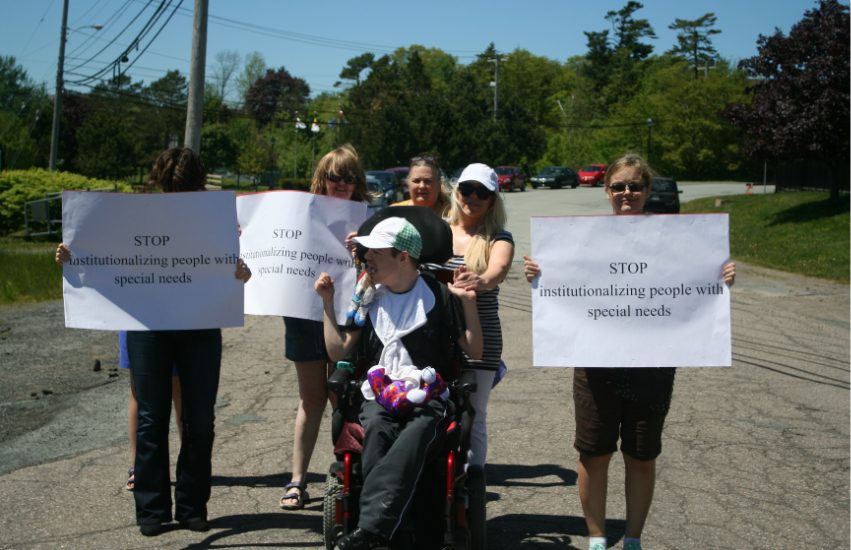
KJIPUKTUK (Halifax) – In Nova Scotia people who live with developmental disabilities are often locked up against their will in large institutions, without the freedom to make any of the minor mundane daily decisions we on the outside take for granted.
Archaic as that may be, getting those people out of institutions and into the community is an uphill battle in Nova Scotia.
Hundreds are institutionalized against their will, and another 1500 or so individuals live at home with aging parents while waiting for a place in a small option home or other type of community living accommodation.
Very little gets done, despite an earlier commitment by the government to address these issues once and for all.
In late February the Nova Scotia Advocate published an open letter to finance minister Karen Casey, written by Wendy Lill, who is the chair of the Community Homes Action Group (CHAG).
The provincial budget was about to be announced, and the group wanted to make sure community living opportunities for people with developmental disabilities would finally receive the priority it so desperately needs.
“The United Nations Convention on the Rights of Persons with Disabilities recognizes the equal rights of all persons with disabilities to live good lives in inclusive communities. It is time for Nova Scotia to also commit fully to meeting that goal,” the letter stated.
Well, earlier this week the budget was revealed and it didn’t contain what the group was hoping for.
There is $7.4 million to begin to move people out of institutions into the community, and another $2.8 million for home support, mostly for people being cared for by their parents. But that’s simply not enough, and ignores the real priority, says Lill.
Moving people away from institutionalization is what community living is all about, and Lill is of course pleased to see the $7.4 million that will decarcerate some 50 people.
But it also raises the question of what these people were doing in an institution in the first place.
“It’s a concern that we are told that these 50 institutionalized people will be receiving independent living support in the community, which is 30 hours of support or less,” she says.
“If all it takes to move these people into the community is that 30 hours of support per week, then that tells me these individuals shouldn’t have been in the institutions to begin with. It means they’ve been incarcerated unnecessarily for too long a time,” says Lill.
The $2.8 million in the budget is money to support individuals who live at home with their parents. It’s just a band aid that doesn’t tackle the real problem, Lill tells the Nova Scotia Advocate.
“I don’t know about you, but I wanted to get out of my family home as soon as I was old enough. I don’t think that changes just because you live with Downs syndrome or something. We want these people to have the same chances and hopes for independence as anybody else. People can contribute, they can have jobs, they socialize, they experience romance, they can do all those things, but they need support. This $2.8 million is really just a stop gap,” says Lill.
It’s a start, but it ignores the central problem, which is the lack of small option homes for people who want to live in their communities, says Lill.
“There are almost 1500 people who now are living with aging parents, sometimes living in quite desperate situations, and there’s been no movement at all in terms of addressing their hopes to move into the community” says Lilll. “There’s been no new capacity and that’s the whole issue.”
“In terms of these small option homes they are exactly where they were two years ago, when they promised eight new small option homes. CHAG had a meeting with Community Services a month ago, and were told that three are now operating, three of them are still being set up, and two of them are just in the planning stage.”
“Altogether, people can look at this budget and say, well, they’re doing something. But it’s leaving so many people behind who are just barely hanging on. These are people who are in desperate situations, they really don’t know what to do anymore,” says Lill.
See also: Op-ed: In Nova Scotia we lock up people with developmental disabilities all the time
See also: NS Human Rights Board ruling of discrimination in warehousing case disappointing
With a special thanks to our generous donors who make publication of the Nova Scotia Advocate possible.
Subscribe to the Nova Scotia Advocate weekly digest and never miss an article again. It’s free!




I must agree that this sad news that only few are going to get placed into independent living. Since the road map has been created those on the ground only seen next to nothing improvement. We need to do better in Nova Scotia. Also if you look at everything which is available to persons with developmental disabilities as a tool box full of tools/or look at them as Puzzles, the creation of more Small Options homes is only adding one missing tool to the box/only adding one missing piece to the puzzle. More needs to happen.